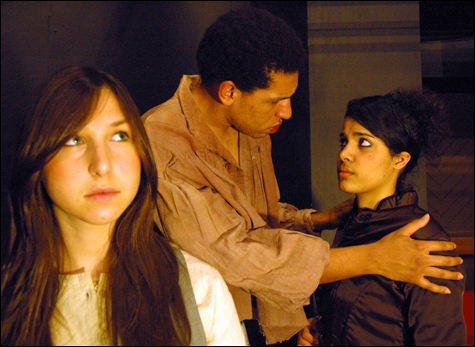
RELENTLESS SYMBOLISM: Ressler, Brown II, and Neal. |
Young California poet and playwright Marcus Gardley has taken on quite an ambitious task with .. . and Jesus Moonwalks the Mississippi, which is being staged by Brown University Theatre and Sock & Buskin (through April 20), directed by Patricia Ybarra.
Unfortunately, while many passages of fervently gathered lyricism are thrust toward us like exotic bouquets between scenes of ordinary conversation, the poetry doesn’t accumulate impact. It remains merely decorative.
The time is 1863 and the places are Mississippi and Louisiana. The play’s virtues and sins are both rooted in the vivid image of its opening. Jesus (Clarence Demesier), whom we later learn is another character’s hallucination, is affixed to a rebar tree of life that is draped with sphagnum moss — and dangling a noose — in Louisa Bukiet’s striking set design. The Mississippi River is present as a winding pattern between raised areas that the actors walk upon. It is also in the form of Mississippi (Erin E. Adams), a narrator who issues most of the poetry, telling us of the tribulations of fleeing slaves and generally representing the mother source of the black South.
Following that promising beginning, with all due respect, the words are not made flesh. All is at the service of this play’s relentless symbolism. Even narrative common sense is expendable upon occasion.
The central character is first named Damascus (Mark Brown II), an escaped slave searching for his daughter, Po’em, as Demeter in Greek mythology sought her daughter Persephone in the underworld. It gives away nothing to reveal that he is captured and hanged on that tree, because he immediately revives and continues his journey calling himself Demeter, dressed as a woman and, softened by his experience, considering himself to be female.
Eventually she arrives at the home of Cadence Marie Verse (Alicia Coneys), a champagne-sipping Southern belle in the midst of hunger. The set design is also apt and impressive on this side of the stage: a full-sized two-story house structure, the 2x4 skeleton only, representing the physical and psychological deterioration of the family.
Cadence’s daughter Blanche (Samantha Ressler) and mulatto stepdaughter Free Girl (Lauren Neal) are seven-year-olds, mutually antagonistic as children can be but obviously attached to each other. One eye-rolling dereliction of logic in this play is that the mother, along with the children, is so fond of their pet hog that she refuses to slaughter it even though they are starving. Another such baffling scene is when the mother, after having been violent to Demeter, is sweetly insistent that she have a nice bowl of gumbo. We have not been prepared for Cadence’s change of heart.
On a parallel journey are the father of the family, Jean Verse (Federico Rodri¬guez), and a 12-year-old known as Yankee Pot Roast (Lucian Cohen), a bugle boy who has fled a bloody battle scene. (As with the girls above, the child is played by a grown-up.) In a scene of comic relief that succeeds, the blue-uniformed Yankee tells Jean why he can never return to the army — he provoked General Grant to murderous rage. (“He turned so deliciously apple-red, I could have eaten him,” the boy describes in a charming line that, typically, ignores the actual emotion of the moment described.) Being an earnest traveler, although a Confederate Army deserter, Jean also represents the wind and explicitly speaks as that character in some of the poetical passages.
Yes, at one point Jesus actually does moonwalk the Mississippi, sliding backwards like an anachronistic Michael Jackson. Although such a moment could have had some evocative and thematic impact, neither the playwright nor the director write or prepare and pace the scene to signify more than a sight gag.
As a play, . . . and Jesus Moonwalks the Mississippi makes a better poetry reading. Lyrical or symbolic and surreal elements can entrance us on stage, as Beckett and Ionesco, among many others, have demonstrated. But such an effort needs to work as drama as well, and this play lacks the needed coherence and structure. Symbols, after all, are merely slogans if they stand alone on a stage. They need to be rooted in recognizably human passions and behavior, however stylized, or they’re as insignificant as placards in a street after the marchers have gone.